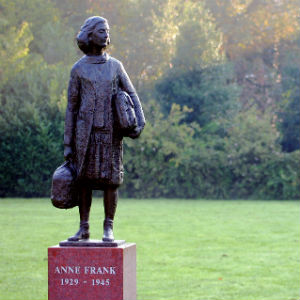August 1, 2019 marks the 75th anniversary of Anne Frank's last diary entry. I was a young girl when I first read Anne Frank: The Diary of a Young Girl, and I loved meeting Anne, even though I knew she wouldn't stay hidden. Her story is powerful, but she is not the only child to be hidden during World War II or other conflicts. This occasion is an opportunity to learn about Anne and the plights of many other children, both real and fictional, who were forced into hiding by conflict and other circumstances.
During the Holocaust, some children were hidden in plain sight. Leon Leyson was the youngest of the children on Schindler's List, which kept many safe by claiming they were workers at a factory essential to the war. The Boy on the Wooden Box tells his story. Hidden Child is Isaac Millman's illustrated memoir of his time during the war, being hidden in plain sight on farms as a Gentile.
Refugee weaves together three fictional stories of children hiding from and escaping conflict throughout the past century. Josef is fleeing Nazi Germany for Cuba in 1939, Isabel is going from Cuba to the United States in 1994 and Mahmoud escapes Syria for Greece in 2015. These are thrilling stories, with real terror and excitement that had me rooting for all the characters the whole way through.
Nowhere Boy: In this fictional tale based on events happening right now, Max is an American who has just moved to Belgium with his family. One night, he hears something in the wine cellar of his house and it turns out to be Ahmed, a Syrian refugee who has lost his home, family and country. The two become fast friends whose differences only bring them closer in this story told by Ahmed and Max in alternating chapters.
My Family Divided: Diane Guerrero, a well-known TV actress, was left behind in the United States when her family was deported. She was hidden in plain sight—the authorities didn't pay attention to her, and she had to make her way through high school and college on her own. It wasn't easy, but she tells this story in a way that is unsparingly honest and still funny at times.
How will you continue to remember and acknowledge the many hidden children of conflicts throughout history?




Add a comment to: Remembering Anne Frank and Other Hidden Children: Books for Kids